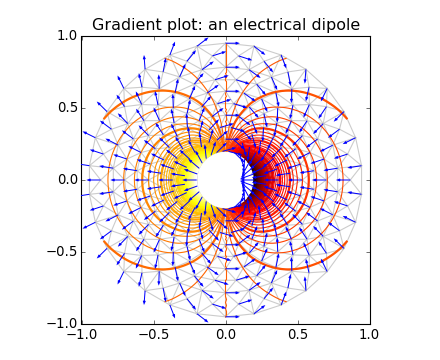

(Source code, png)

"""
Demonstrates computation of gradient with matplotlib.tri.CubicTriInterpolator.
"""
from matplotlib.tri import Triangulation, UniformTriRefiner,\
CubicTriInterpolator
import matplotlib.pyplot as plt
import matplotlib.cm as cm
import numpy as np
import math
#-----------------------------------------------------------------------------
# Electrical potential of a dipole
#-----------------------------------------------------------------------------
def dipole_potential(x, y):
""" The electric dipole potential V """
r_sq = x**2 + y**2
theta = np.arctan2(y, x)
z = np.cos(theta)/r_sq
return (np.max(z) - z) / (np.max(z) - np.min(z))
#-----------------------------------------------------------------------------
# Creating a Triangulation
#-----------------------------------------------------------------------------
# First create the x and y coordinates of the points.
n_angles = 30
n_radii = 10
min_radius = 0.2
radii = np.linspace(min_radius, 0.95, n_radii)
angles = np.linspace(0, 2*math.pi, n_angles, endpoint=False)
angles = np.repeat(angles[..., np.newaxis], n_radii, axis=1)
angles[:, 1::2] += math.pi/n_angles
x = (radii*np.cos(angles)).flatten()
y = (radii*np.sin(angles)).flatten()
V = dipole_potential(x, y)
# Create the Triangulation; no triangles specified so Delaunay triangulation
# created.
triang = Triangulation(x, y)
# Mask off unwanted triangles.
xmid = x[triang.triangles].mean(axis=1)
ymid = y[triang.triangles].mean(axis=1)
mask = np.where(xmid*xmid + ymid*ymid < min_radius*min_radius, 1, 0)
triang.set_mask(mask)
#-----------------------------------------------------------------------------
# Refine data - interpolates the electrical potential V
#-----------------------------------------------------------------------------
refiner = UniformTriRefiner(triang)
tri_refi, z_test_refi = refiner.refine_field(V, subdiv=3)
#-----------------------------------------------------------------------------
# Computes the electrical field (Ex, Ey) as gradient of electrical potential
#-----------------------------------------------------------------------------
tci = CubicTriInterpolator(triang, -V)
# Gradient requested here at the mesh nodes but could be anywhere else:
(Ex, Ey) = tci.gradient(triang.x, triang.y)
E_norm = np.sqrt(Ex**2 + Ey**2)
#-----------------------------------------------------------------------------
# Plot the triangulation, the potential iso-contours and the vector field
#-----------------------------------------------------------------------------
plt.figure()
plt.gca().set_aspect('equal')
plt.triplot(triang, color='0.8')
levels = np.arange(0., 1., 0.01)
cmap = cm.get_cmap(name='hot', lut=None)
plt.tricontour(tri_refi, z_test_refi, levels=levels, cmap=cmap,
linewidths=[2.0, 1.0, 1.0, 1.0])
# Plots direction of the electrical vector field
plt.quiver(triang.x, triang.y, Ex/E_norm, Ey/E_norm,
units='xy', scale=10., zorder=3, color='blue',
width=0.007, headwidth=3., headlength=4.)
plt.title('Gradient plot: an electrical dipole')
plt.show()
Keywords: python, matplotlib, pylab, example, codex (see Search examples)